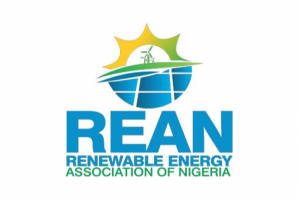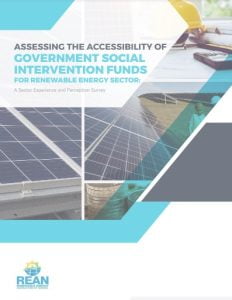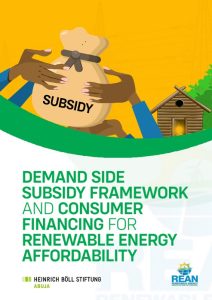Publications

Advocacy and Engagement on Fiscal Incentives and Importation Procedures for Renewable Energy Technologies in Nigeria
The transition to renewable energy is critical for Nigeria’s sustainable development and energy security. As the country seeks to diversify its energy mix and reduce its reliance on fossil fuels, the effective importation and deployment of renewable energy technologies are of paramount importance. This report, provides a detailed analysis of the current fiscal incentives and…

Bridging the Gap: Addressing Energy Poverty, Inequality through Renewable Energy
Lack of electricity in Nigeria critically affects the overall development of its economy. The country has the world’s largest absolute electricity access deficit, with 45 per cent of the population (90 million) lacking access to the electricity grid, a recent World Bank report states. Large disparities exist in access to electricity between urban areas (84…

Energy Deficit Impact on Women in Rural Areas in Nigeria (Fact Sheet)
Nigeria’s energy crisis not only hampers its industrial and economic growth but also affects the daily lives of its citizens. Women and children are greatly impacted as a result of persistent energy challenges, especially in rural areas. Many communities in Nigeria remain unconnected to the national grid, and some that are connected receive inadequate service,…

Sustainable Approaches to Reducing Carbon Footprint
Climate change is a pressing global challenge that is currently underway, posing a significant threat to humanity due to the high levels of carbon emissions. To effectively address the impact of climate change, it is important for us to adopt sustainable practices aimed at reducing our carbon footprint. The Renewable Energy Association of Nigeria (REAN)…

Clean Energy & Carbon Emissions Reduction
Carbon emissions primarily result from human activities such as burning fossil fuels, industrial processes, transportation, domestic activities, and deforestation. These emissions contribute to the greenhouse effect by trapping heat in the atmosphere and causing global warming, which negatively impacted the environment and human well-being. Reducing carbon emissions requires collective efforts and strategies aimed at cutting…

7 Facts On Solar Energy
Solar energy is a type of renewable energy that comes from the sun. It is created through the conversion of sunlight into usable energy, such as electricity or heat (thermal). This process is typically achieved through the use of solar panels or concentrated solar power systems. Solar energy is a highly abundant energy resource, in…

Assessing the Accessibility of Government Social Intervention Funds for Renewable Energy Sector
Series of government intervention funds have been designed and rolled out to promote the upscale of renewable energy deployment in Nigeria. Many of these funds have been managed through specialised government banks and deposit money banks. How accessible are these government intervention funds for local renewable energy companies; especially the growing ones? Assessing the Accessibility…

Future-proofing the expanding market: Recommendations for improving the bankability of the mini-grid regulatory framework in Nigeria
Over the last few years, mini-grids have played a key role in implementing Nigeria’s energy access and sustainable energy goals. They are now widely acknowledged as an integral component of the country’s energy ecosystem, delivering sustainable and reliable electricity access to nearly 27 thousand households living in areas that, until now, were out of reach…

Nigeria’s Energy Transition Plan
The Nigerian government, through Vice President, Yemi Osinbajo, in collaboration with Sustainable Energy for All, launched the Nigeria Energy Transition Plan (NETP) on 24th August 2022. The Nigeria Energy Transition Plan aims to showcase the country’s pathway to achieving net-zero emissions by 2060 and its leadership role in enabling a just and equitable climate future…

Demand Side Subsidy Framework and Consumer Financing for Renewable Energy Affordability
Energy access is a key development, and off-grid solutions (OGS) are being deployed to close the energy access gap in line with the sustainable development goals (SDG) 7, which aims to ensure access to affordable, reliable, sustainable, and modern energy for all. However, achieving SDG 7 will depend on energy affordability. In Nigeria, a majority…
